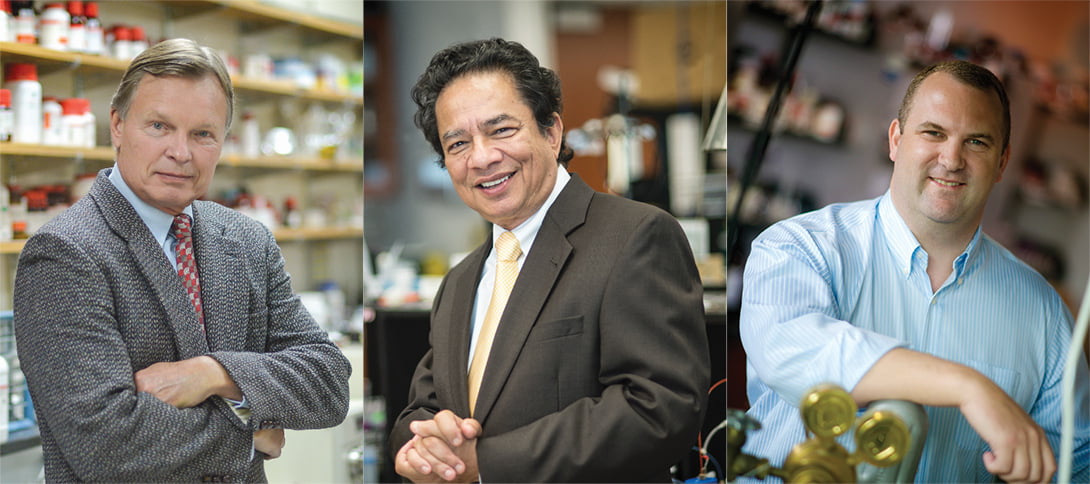Life Sciences Building, Room 206
501 S. Nedderman Drive
Box 19047
Arlington, TX 76019
UTA chemists recognized for global influence

Three professors from the Department of Chemistry and Biochemistry at The University of Texas at Arlington have been named among the top 100 scientists in the world by The Analytical Scientist magazine.
The honorees are:
• Daniel Armstrong, R.A. Welch Distinguished Professor in Chemistry;
• Purnendu “Sandy” Dasgupta, the Hamish Small Chair in Ion Analysis, and;
• Kevin Schug, Shimadzu Distinguished Professor of Analytical Chemistry.
The magazine selected the UTA trio to its 2021 Power List, which highlights the most influential analytical scientists from across the globe.
“It is a great honor and privilege to work alongside some of the world’s most innovative and accomplished scientists,” College of Science Dean Morteza Khaledi said. “The UTA community has long been aware of our chemists’ immense talent, and now the rest of the world knows, too.”
Also named to the list was Alain Berthod, professor in the Institute of Analytical Science at the University of Lyon, France, who is a visiting scientist in Armstrong’s lab at UTA this year. Berthod is the editor of the journal Separation & Purification Reviews.
Armstrong is a global pioneer in the field of chiral separations. His research investigates this area and other novel stationary phases for separations, including those based on ionic liquids that can withstand very high temperatures. His current interests include theory and practice of ultrafast separations and the role of D-amino acids in living systems.
He received the 2020 Lifetime Achievement in Chromatography Award by LC GC, the largest multimedia platform of peer-reviewed technical information in the field of chromatography and the separation sciences. Prior to Armstrong’s contributions to the field, enantiomeric separations—involving nonsuperimposable, mirror-image molecules—were traditionally considered one of the more difficult problems in separation science. He continues to be a prolific author and mentor.
In 2019, Dasgupta engineered a device that, as it travels through space, can collect drops of liquid and analyze their content for conditions that support life. To accomplish this, he created an instrument platform called open-tubular chromatography to detect and separate ions. He has received numerous national and international honors for his work in recent years, including the Atlanta Medal and being named the 2018 Distinguished Texas Scientist by the Texas Academy of Science. He also received the 2018 American Chemical Society’s Division of Analytical Chemistry Chemical Instrumentation Award.
“I attribute this recognition entirely to the work my students have done. I am just basking in their reflected glory,” Dasgupta said. “It is a privilege to work with my esteemed peers. I can confidently say there is no other institution in the world where a student can receive a better graduate education in analytical chemistry.”
Schug’s research focuses on the theory and application of separation science and mass spectrometry for solving a variety of analytical and physical chemistry problems in the fields of environmental, pharmaceutical, biological and energy research. In a project funded by the National Science Foundation, Schug aims to simplify chemical analysis through the creation of a database that assists scientists in the operation of automated analysis instruments.
Schug, who is also the director of the Collaborative Laboratories for Environmental Analysis and Remediation (CLEAR), credits the dedication of his students for the influence of his laboratories’ research.
“I’m very pleased to be recognized alongside my colleagues here at UTA and around the world,” Schug said. “It is an honor to be mentioned in the same light as so many great scientists who are constantly pushing the boundaries of analytical science.
“Above all, I give my students the credit for this recognition; their efforts to constantly advance our own research agenda cannot be overstated.”
The 2021 Power List is The Analytical Scientist’s ninth annual celebration of the world’s most influential analytical scientists.
Armstrong, Dasgupta, and Schug have all been named multiple times to the various formats of the magazine’s list in its nine-year history. All three were included in the 2019 Top 100 Power List, with Armstrong ranking No. 8. Armstrong and Dasgupta also appeared in the 2017 edition, which included the top 10 scientists in 10 different categories.
Armstrong ranked No. 16 on the magazine’s inaugural Power List of the top 100 most influential people in analytical sciences in 2013, and he was No. 8 on the 2015 list. Dasgupta was named to the 2015 field, while Schug, who also serves as director of the Collaborative Laboratories for Environmental Analysis and Remediation (CLEAR), appeared on the Top 40 Under 40 list of young analytical scientists in 2014.
In addition, Muhammad Farooq Wahab, a UTA research engineering scientist, was named to the 2018 Top 40 Under 40 Power List.
To identify the top scientists in the field for the 2021 list, the publication held open nominations before a panel of expert, independent judges narrowed down the candidates to the final 100.
--
The UTA College of Science, a Texas Tier One and Carnegie R1 research institution, is preparing the next generation of leaders in science through innovative education and hands-on research and offers programs in Biology, Chemistry & Biochemistry, Data Science, Earth & Environmental Sciences, Health Professions, Mathematics, Physics and Psychology. To support educational and research efforts visit the giving page, or if you're a prospective student interested in beginning your #MaverickScience journey visit our future students page.